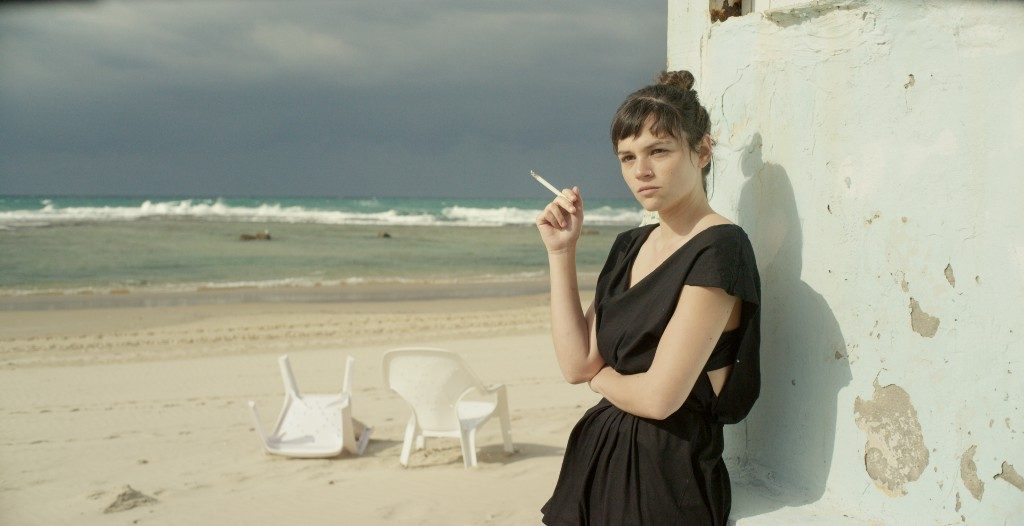Keren Ben Rafael is a writer-director based in Israel and France. Her previous credits include shorts “La Plage” and “Northern Lights” and doc “Bite Into Life.”
“Virgins” will premiere at the 2018 Tribeca Film Festival on April 19.
W&H: Describe the film for us in your own words.
KBR: A rumor of a mermaid brings unexpected attention to the godforsaken town of Kiryat Yam, where a barefaced adolescent (Joy Rieger), her moody mother (Evgenia Dodina), and her princess-like cousin (Manuel Elkaslassy Vardi) will do anything to grasp the opportunity and change their lives.
W&H: What drew you to this story?
KBR: I read a news article about a mermaid “seen” in Kiryat Yam, and how the mayor tried to use it to get his poor town in the spotlight. I was attracted to the story and found it to be a great setting, both cinematic and symbolic, to narrate an adolescent’s path to femininity.
W&H: What do you want people to think about when they are leaving the theater?
KBR: I’d like them to think about the possibility that something else exists — something beyond the everyday struggle.
W&H: What was the biggest challenge in making the film?
KBR: The biggest challenge was to make the film on a tight budget. I had to hold on to the heart of the film, those things that were the most important for me and for the story, and be very flexible about all the rest. Without some flexibility on other elements, I wouldn’t have been able to complete the film.
W&H: How did you get your film funded? Share some insights into how you got the film made.
KBR: The film was ultimately made thanks to people who believed in it, but it was a struggle to get the funds. We hit the road thanks to producer Caroline Bonmarchand’s energy, the distributors, Pyramide, and co-producers — United King, Artza, and Frakas — that came on board. Fortunately afterwards we got some European funds as well.
All in all we worked on a very tight budget, the shooting was short, and I hopped between countries to get the post-production done.
W&H: What does it mean for you to have your film play at Tribeca Film Festival?
KBR: It’s amazing. I feel very lucky to premiere in such a great festival. Personally, I really like the fact that the festival actively supports female directors, and it feels like even a better match with my film that celebrates strong feminine characters.
W&H: What’s the best and worst advice you’ve received?
KBR: I participated in the Jerusalem Film Lab where one of the most celebrated Israeli directors, Avi Nesher, was my mentor. Every time I lost confidence in myself or in the film I’d ring him, and he’d just fill me up with positive energy. You should always keep in mind what made you start out, he’d say. You’ll get so much good — and very bad — advice on the way. You must stick to your initial thesis, which is where the truth lies.
The worst advice I’ve received was to wait for national funds. I’d be still waiting!
W&H: What advice do you have for other female directors?
KBR: One of the most empowering things was to be able to work on this film with very close female friends. It’s sometimes hard but it helps you keep on track and lets you feel less lonely in front of the responsibility and the never-ending choices. Elise Benroubi wrote the script with me and is a former classmate, Ella Spector, the art director, is a childhood friend, and Daniel Avitzur, someone I’ve been friends with for years, edited the film. The amazing actresses have become close friends as well.
For mothers I’d say keep close to grandmas because you’ll need them!
W&H: Name your favorite woman-directed film and why.
KBR: “La Ciénaga” by Lucrecia Martel. I love the strange ambiance in this film, and, actually, everything about it! The characters, the heaviness, the cinematography, and the pace. It’s very human and relatable, in the most surprising and captivating way. It’s simple and complex, beautiful and tragic — it’s pure cinema.
W&H: Hollywood and the global film industry are in the midst of undergoing a major transformation. Many women — and some men — in the industry are speaking publicly about their experiences being assaulted and harassed. What are your thoughts on the #TimesUp movement and the push for equality in the film business?
KBR: I support the movement across all industries and am looking forward to the day when women are equal in all fronts. But when making films, I put female heroes in the center and choose many women to join the crew because it’s natural for me, and not as a statement.







